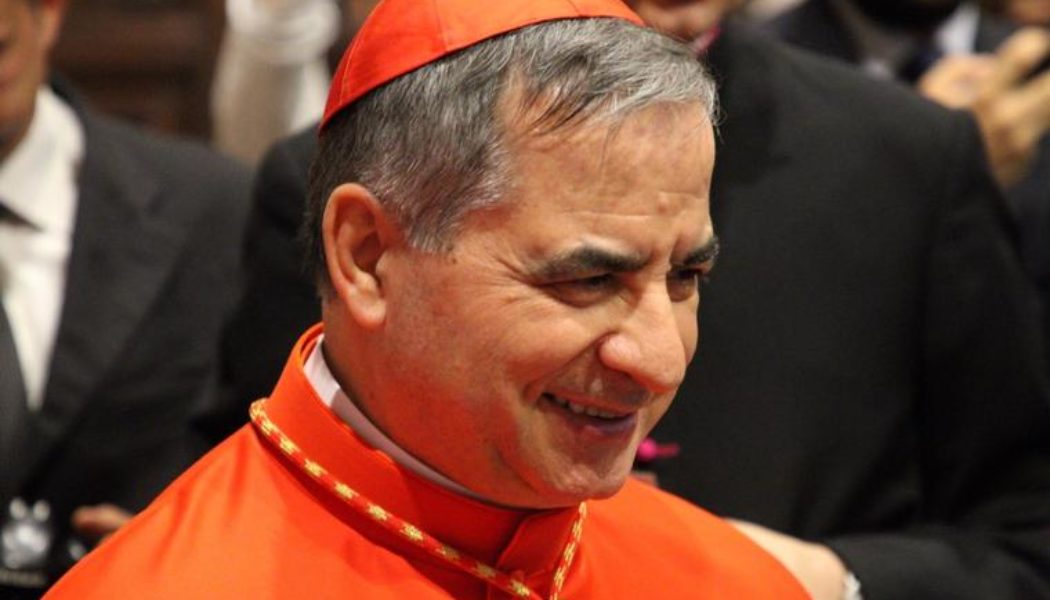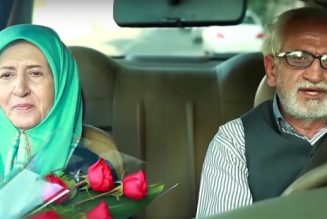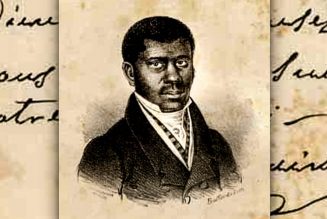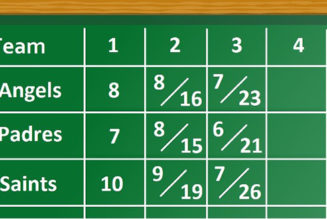
Cardinal Angelo Becciu, the Vatican cardinal who is appealing his embezzlement conviction last year, has pushed back against recent claims made by the Vatican’s chief editorial director, criticizing his “vaguely moralistic tone” and saying “we are dealing with a criminal trial, not a trial aimed at teaching lessons.”
In a commentary published in L’Osservatore Romano and Vatican News Nov. 11, the former deputy Vatican secretary of state said an Oct. 30 editorial by Andrea Tornielli “surprised” him as he had appreciated the “balance and accuracy” of Vatican News during the trial.
Tornielli, a top official in the Vatican’s Dicastery for Communication, had penned his reaction, published in L’Osservatore Romano and Vatican News, to a Vatican Tribunal’s publication of its reasons for convicting Cardinal Becciu and other defendants for their role in the sale of a Vatican-owned property in London that resulted in losses to the Holy See of 200 million euros.
After hearings over three years, the tribunal found Cardinal Becciu guilty on three counts of embezzlement and sentenced him to five years and six months in prison. He also was fined and permanently disqualified from holding public office. Becciu was the first cardinal to be tried by a Vatican tribunal.
The Vatican’s editorial director made two main observations in his analysis of the judgment: firstly that the trial was fair, contrary to the criticisms of Cardinal Becciu and the other defendants, and secondly that it showed the need for prelates and those in charge of Vatican finances to be held accountable for their actions.
Tornielli, who did not explicitly name Cardinal Becciu in the editorial, said the defendants had a “wide possibility” of constructing their defense and that facts and documents pertaining to the case were examined “without omitting anything.” The principle of “equality of arms” had been “fully guaranteed,” he asserted, and a “fair trial has been held with the right of defense and the presumption of innocence.”
On the issue of accountability, Tornielli referred to the Synod on Synodality’s call for “transparency,” adding that clericalism can lead to the “implicit assumption” that those in authority in the Church “should not be held accountable for their actions and decisions.”
The massive losses for the Holy See of 200 million euros were “unprecedented,” he added, and he criticized, without naming them, those who turn money into “an instrument of personal power” and fail to act like “good family fathers.”
“It is a good thing,” he added, that, as a result of financial reforms, the Holy See now has “antibodies” that can help prevent such losses from happening again.
In his response to the editorial, Cardinal Becciu strongly protested his innocence. He said he did not wish to contest Tornielli’s reading of it as a “fair trial,” but added he had “grounds to do so” and proceeded to assert that his right to defense was sometimes compromised.
He recalled the importance of his role as an “intermediary between the Pope and the secretariat of state,” and stressed it was “based on trust and constant contact with the higher authority.” He said he, along with his predecessors, had made mistakes, but he repeated what he had said in the trial: that he had “always acted according to my prerogatives, never exceeding my powers and always with total fidelity to the Holy See.”
The cardinal took issue with Tornielli’s claim that the trial examined facts and documents “without omitting anything,” but then said he was prepared to ignore that as “time will come to talk about the evidence in my favor which was totally overlooked by the judgment.”
Cardinal Becciu took the opportunity in his commentary to vehemently protest allegations he had defrauded the Pope by having him greenlight funds for a kidnapped religious sister’s release, insisting the operation was solely for humanitarian purposes. The Vatican court’s judgment condemned him for failing to distance himself from the supposed negotiator, geopolitical expert Cecilia Marogna, who instead of using the funds to help free the sister’s release, spent the money on luxury goods. The judgment said the cardinal had “completely friendly relations” with Marogna, “if not of real familiarity.”
“I am truly astonished and strongly reject this inference!” Becciu said. “If I had cheated the Pope, I certainly would not be here shouting my innocence to the world! These allegations are unacceptable and above all unsupported by any evidence!”
After that slight digression he returned to criticizing Tornielli’s editorial, and specifically the Italian journalist’s call for accountability. Tornielli’s reading, he said, “does not reflect reality,” as controls were already in place and now there are others, “perhaps more bureaucratic, not necessarily better.” Cardinal Becciu also observed that although the secretariat of state no longer has the power to manage money, that responsibility “has simply moved elsewhere.”
He acknowledged that the sums involving the London property were “enormous” but insisted they were not without precedent and had the “approval of the superior at the time,” namely the head of the Vatican’s administrative office (Msgr. Alberto Perlasca, a star witness in the trial who therefore avoided prosecution). As in the trial, Cardinal Becciu sought to shift responsibility to others, including Pope Francis, whom he said knew all about the London property sale, although the extent of the Pope’s involvement has never been fully known.
But he also took issue with what he called Tornielli’s “vaguely moralistic tone,” saying “we are dealing with a criminal trial, not a trial aimed at teaching lessons.” He also stressed that he and his fellow defendants should all be “presumed innocent” until the appeal is heard. Neither he, nor his family members, received “any financial benefit,” he said, repeating what he has said in the trial.
As in the trial, he protested his innocence, saying he is “an alleged innocent” who was presumed guilty from the start, someone who was trying to help save the Holy See from debt that “seems to have no end” and not just because of the London investment which was “potentially a very good investment.”
The cardinal said he “lost everything” on the basis of an “ideological perception of facts” and suggested that the truth was being sacrificed for political expediency and to avoid harming the image of the Holy See and the Pope.
“But truth, according to a saying attributed to St Augustine, is like a lion and will defend itself,” he said.
The Register asked Andrea Tornielli if he would like to comment on Cardinal Becciu’s article but he had not responded by press time.







